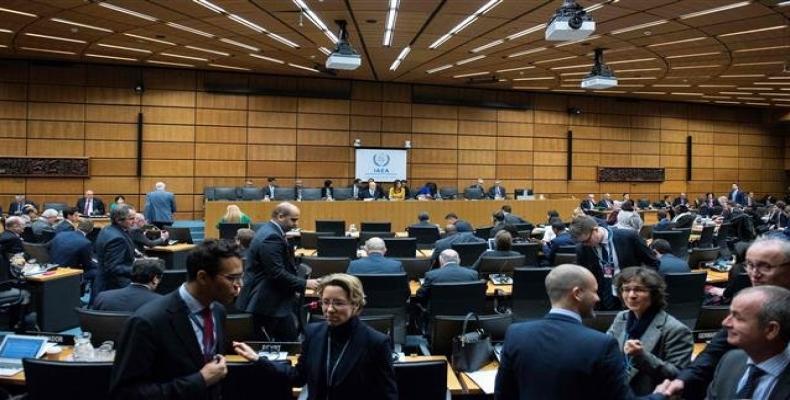Geneva, November 23 (RHC)-- The United Nations' nuclear watchdog confirms Iran's full compliance with its end of the 2015 multinational nuclear deal, despite Washington's internationally-criticized withdrawal from the landmark accord and the ensuing re-imposition of its unilateral sanctions against the Islamic Republic.
Addressing a quarterly meeting of the International Atomic Energy Agency (IAEA)'s Board of Governors, the Agency's Director General Yukiya Amano said: "Iran is implementing its nuclear-related commitments under the Joint Comprehensive Plan of Action (JCPOA)," referring to the deal by its official name.
The IAEA chief further called on Iran to continue fully respecting the landmark accord, which Washington scrapped back in May despite strong criticisms from the other signatories -- France, the UK, Germany, Russia and China -- as well as the entire world community.
"The Agency continues to verify the non-diversion of nuclear material declared by Iran under its Safeguards Agreement. Evaluations regarding the absence of undeclared nuclear material and activities in Iran continue," added Amano in the Iran section of his speech.
The agency under Amano's watch is tasked with monitoring the technical aspects of the nuclear deal's implementation. The IAEA's latest report comes about two weeks after the US administration finished restoring all the anti-Iran sanctions it had lifted under the JCPOA, which has been ratified by UN Security Council Resolution 2231.
The administration of U.S. President Donald Trump also resorted to a highly hostile campaign of maximum pressure against Iran in the aftermath of its exit from the deal, threatening "secondary sanctions" against all those firms that fail to abide by the American bans and keep doing business with Iran.
On the other camp, Iran's remaining partners and the European Union -- which represented them during the talks with Tehran in the run-up to the JCPOA -- have vowed all-out efforts to keep the deal alive and protect their firms and business links with the Islamic Republic.
They are working to finalize a measure -- known as a special purpose vehicle (SPV) -- aimed at persuading Iran to stay in the deal. The SPV is a sort of clearing house designed to allow the European companies doing business with Iran to bypass the newly re-imposed U.S. sanctions, and is slated to be set up in Europe within months.
Tehran has hailed Europe's political will to save the accord, but wants it to take concrete actions to compensate for Washington's absence. Iran has said it will leave the JCPOA if the other parties fail to pave the pave for the country to reap the economic dividends of the deal.
IAEA says Iran respecting nuclear deal weeks after U.S. bans reinstated

Matérias relacionadas
Comentários
Deixe um comentário
Todos os campos são requeridosMais vistas
- Tarde de livros, emoções e trocas na Feira de Esportes
- Os Estados Unidos anunciam restrições de vistos relacionadas à cooperação médica internacional de Cuba
- Nicarágua assinará acordo com China para projeto de energia eólica
- Ministro do Esporte de Serra Leoa inicia visita a Cuba
- Alemanha: conservadores no poder

